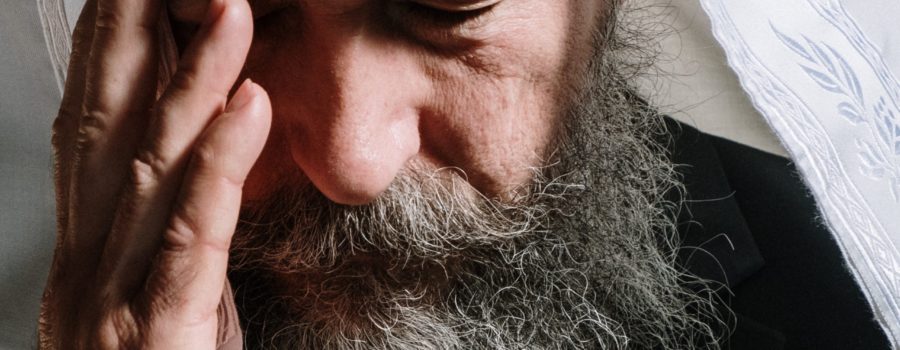One of the distinctly Jewish elements in the Stick of Joseph is the customs and practices concerning prayers. The following are a few examples:
Prayer Before a Mitzvah
The Stick of Joseph records the custom of reciting a special prayer before performing a mitzvah (commandment) so as to sanctify the act to Elohim:
But behold, I say to you that you must pray always, and not faint; that you must not perform anything to YHWH save in the first place you shall pray to the Father in the name of Messiah, that he will consecrate your performance to you, that your performance may be for the welfare of your soul.
(2 Nefi 14:3)
This is a Jewish custom, as Leo Trepp writes:
Before we perform a Mitzvah, we put ourselves “in tune” by speaking:
Barukh attah Adonai Elohenu Melek ha-Olam asher kid-shanu be-mitzvotav vetzivanu…
Blessed are You, Lord our God, Ruler of the universe, You are He, who has sanctified us by His commandments, and commanded us…
This is followed by the Mitzvah we are about to perform, for instance, on putting on the Tallit:
Lehitatef ba-Tzitzit
(to wrap ourselves in Tzitzit.)
(The Complete Book of Jewish Observance; Leo Trepp p. 45)
Another example of this practice can be seen when Alma prayed before immersing at the waters of M’raman:
And now it came to pass that Alma…went and stood forth in the water, and cried, saying, O YHWH, pour out your spirit upon your servant, that he may do this work with holiness of heart.
(Moshiyah 9:8)
Praying After Meals (rather than before)
Though the typical gentile custom in the time of Yosef ben Yosef was to pray before meals, The Stick of Joseph records the Jewish custom of praying after a meal among the Nefites:
And it came to pass that Alma ate bread and was filled; and he blessed Amulek and his house, and he gave thanks to Elohim,…
(Alma 6:7)
Leo Trepp writes the following concerning this Jewish practice:
All the Berakhot were instituted by the Rabbis, but Grace after Meals is ordained in the Torah, as the Rabbis explain.
(The Complete Book of Jewish Observance; Leo Trepp p. 62)
This custom originated with a command in Deuteronomy:
When thou hast eaten and art full, then thou shalt bless the LORD thy God for the good land which he hath given thee.
(Deut 8:10 KJV)
The practice of praying after meals is also mentioned in the Dead Sea Scrolls in a hymn entitled “Invitation to Grace After Meals” (see The Dead Sea Scriptures; 3rd Edition; Theodore Gaster; pp. 219-221) as well as the Talmud (b.Berekhot 47b-49b).
Three Times of Prayer Daily
The Stick of Joseph prescribes the Jewish practice of three times of prayer daily:
Cry onto him in your houses,
(Alma 16:35)
yes, over all your household,
both morning, mid-day, and evening.
As we read in the Complete Book of Jewish Observance:
The Rabbis instituted three prayers for every day, as we have seen: Shaharit, Minhah, Maariv… Shaharit, the Morning Prayer… Minhah, the afternoon prayer… and Maariv… is offered after night has fallen…
(Complete Book of Jewish Observance; Leo Trepp pp. 45-49)
And according to Messianic Jewish commentator David Stern:
According to one Talmudic source (B’rakhot 26b) the three prayer services were instituted after the fall of the First Temple to replace the [three times of] sacrifices… The three services were called Shacharit (“morning”0, Minchah (“afternoon”) and Ma’ariv (“evening”).
(The Jewish New Testament Commentary; David Stern; p. 228 (on Acts 3:1))
In fact the Talmud actually records a dispute between Rabbi Joshua ben Levi, who taught that the three times of prayer were instituted to replace the daily sacrifices, and Rabbi Jose, the son of Rabbi Hanina, who taught that the three times of prayer had been instituted by the Patriarchs Abraham, Isaac and Jacob:
It has been stated: R. Jose son of R. Hanina said: The Tefillahs were instituted by the Patriarchs. R. Joshua b. Levi says: The Tefillahs were instituted to replace the daily sacrifices.
(b.Berechot 26b)
The Stick of Joseph (Supported also by Psalm 55:18 (17) settles the matter. The three times of prayer were known to the Nefites, who had left Jerusalem before the destruction of the First Temple, so therefore the three times of prayer came about prior to the loss of the daily sacrifices, and were likely instituted by the Patriarchs.
Praying the Shehecheyanu
King Binyamin commemorated Sukkot with a blessing very similar to the Shehecheyanu, which is a Jewish prayer traditionally said at special occasions in the year, such as holidays. The traditional Shehecheyanu reads:
Praise be to You
YHWH our Elohim, King of the Universe,
who has kept us,
and has preserved us,
and enabled us to reach this season.
While Binyamin says:
…render all thanks and praise… to that Elohim
Moshiyah 1:8
who has created you and has kept you
and preserved you
and has caused that you should rejoice.
King Binyamin’s version differs slightly from the currently practiced Shehecheyanu in gratitude for rejoicing, rather than gratitude for having reached a season. The difference may be accounted for because this was a First Temple Era version of the prayer. Alternatively, because Binyamin’s prayer was given at Sukkot, at which we are commanded “ye shall rejoice” (Lev. 23:40), this version may have been specific to Sukkot.
Conclusion
It would have been very unlikely for Yosef ben Yosef, a farm boy raised in a Protestant Christian environment, to have been aware of these Jewish practices. The prayer practices among the Nefites demonstrate once again that the Stick of Joseph is a Jewish book.



Leave a Reply